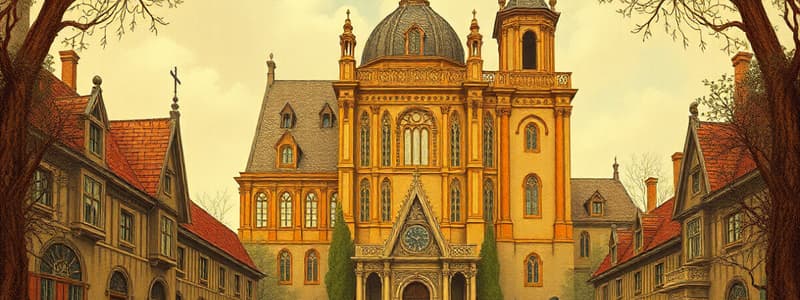Podcast
Questions and Answers
What fundamental belief characterized the Puritans' view of salvation?
What fundamental belief characterized the Puritans' view of salvation?
- Only the Elect, chosen by God, receive salvation. (correct)
- Salvation is achieved through good deeds.
- Salvation comes from community worship and rituals.
- Everyone will eventually be saved regardless of their beliefs.
Which statement is true about Separatist Puritans?
Which statement is true about Separatist Puritans?
- They sought to reform the Church of England from within.
- They believed in complete alignment with the Church of England.
- They rejected the Church of England entirely and fled to Holland. (correct)
- They formed the Massachusetts Bay Colony in 1630.
What was the primary reason for the Puritans' self-examination?
What was the primary reason for the Puritans' self-examination?
- To find ways to conform better to the Church of England.
- To gain more followers in their faith.
- To publicly demonstrate their faith to the community.
- To determine if they were part of the Elect. (correct)
In what year did the Non-Separatist Puritans establish the Massachusetts Bay Colony?
In what year did the Non-Separatist Puritans establish the Massachusetts Bay Colony?
What was a distinguishing feature of the Puritans' doctrine regarding original sin?
What was a distinguishing feature of the Puritans' doctrine regarding original sin?
What did the Puritans believe regarding the interpretation of the Bible?
What did the Puritans believe regarding the interpretation of the Bible?
Which of the following best describes Puritan views on rituals and adornments in worship?
Which of the following best describes Puritan views on rituals and adornments in worship?
What was one of the reasons Harvard University was founded by the Puritans?
What was one of the reasons Harvard University was founded by the Puritans?
How did the Puritans view education and its relationship to economic success?
How did the Puritans view education and its relationship to economic success?
What was the Puritan attitude towards women's capabilities?
What was the Puritan attitude towards women's capabilities?
Why did the Puritans reject works of fiction?
Why did the Puritans reject works of fiction?
What did the Puritans believe about daily events in relation to God’s influence?
What did the Puritans believe about daily events in relation to God’s influence?
What did Puritans emphasize as part of their work ethic?
What did Puritans emphasize as part of their work ethic?
Flashcards are hidden until you start studying
Study Notes
Overview of the Puritans
- Puritans were a Protestant faction focused on reforming the Church of England, gaining prominence in the 16th and 17th centuries.
- Preferred the term “the Godly” but were labeled “Puritans” due to their desire to purify the church.
Types of Puritans
-
Separatists:
- Believed compromise with the Church of England was impossible; regarded it as corrupt.
- Fled to Holland before establishing Plymouth Colony in America in 1620.
- Faced persecution in England under various monarchies.
-
Non-Separatists:
- Advocated for reform within the Church rather than complete separation.
- Arrived in America in 1630 and founded the Massachusetts Bay Colony.
Doctrine of Election and Predestination
- Man is inherently sinful due to original sin, making total depravity unavoidable.
- Only the Elect—those chosen by God—attain salvation; it is not dependent on individual belief or deeds.
- God's grace empowers the Elect to fulfill divine will, leading them towards righteousness.
Puritan Self-Examination
- Conversion experiences were essential for perceived acceptance by God.
- Demonstration of grace was assessed through one’s behavior, leading to self-scrutiny for signs of divine favor.
- A godly lifestyle was essential, although it was believed that good works do not earn entry to Heaven.
Daily Life and Puritan Views
- Constantly sought signs of divine intervention, viewing meaning in all occurrences.
- Believed in a continuous battle between good (God) and evil (Satan).
Puritan Beliefs and Practices
- Advocated a literal and straightforward interpretation of the Bible, rejecting elaborate rituals and adornments.
- Emphasized simplicity in worship, which excluded singing, music, and decorative elements to focus solely on God.
- Held a firm belief that divine justice rewarded the virtuous and punished the wicked.
Education and Work Ethic
- Promoted a disciplined and self-examined life as virtuous, correlating hard work with economic success.
- Valued education highly; Harvard University was established in 1636 to train ministers.
- Aimed for their children to steer clear of England's corruptions; boys learned hunting and fishing, girls were trained in household management.
Gender Roles
- Adopted a patriarchal view of women, deeming them intellectually, physically, and morally inferior, influenced by the biblical narrative of Eve.
Puritan Literature
- Literature was not created for enjoyment; focused on the hardships of settlement life.
- Fiction was perceived as frivolous and potentially immoral, leading to severe censorship of pleasure literature.
Studying That Suits You
Use AI to generate personalized quizzes and flashcards to suit your learning preferences.




